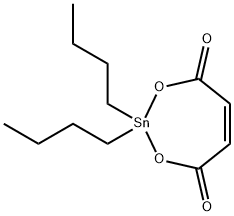A3097312
Ditin butyl dilaurate , 95% , 77-58-7
Synonym(s):
DBTDL;Dibutylbis(lauroyloxy)stannane, Dibutyl bis(lauroyloxy)tin;Dibutyltin dilaurate
CAS NO.:77-58-7
Empirical Formula: C32H64O4Sn
Molecular Weight: 631.56
MDL number: MFCD00008963
EINECS: 201-039-8
Update time: 2022-07-08
PRODUCT Properties
| Melting point: | 22-24°C |
| Boiling point: | >204°C/12mm |
| Density | 1.066 g/mL at 25 °C(lit.) |
| vapor pressure | 0.2 mm Hg ( 160 °C) |
| refractive index | n |
| Flash point: | >230 °F |
| storage temp. | Store below +30°C. |
| solubility | <1.43mg/l |
| form | Oily Liquid |
| color | Clear pale yellow |
| Specific Gravity | 1.066 |
| Water Solubility | <0.1 g/100 mL at 20 ºC |
| FreezingPoint | 8℃ |
| Merck | 14,3038 |
| BRN | 4156980 |
| Exposure limits | ACGIH: TWA 0.1 mg/m3; STEL 0.2 mg/m3 (Skin) NIOSH: IDLH 25 mg/m3; TWA 0.1 mg/m3 |
| Stability: | Stability Combustible. Incompatible with strong oxidizing agents. May be air sensitive. |
| InChIKey | UKLDJPRMSDWDSL-UHFFFAOYSA-L |
| LogP | 3.120 |
| CAS DataBase Reference | 77-58-7(CAS DataBase Reference) |
| EPA Substance Registry System | Dibutyltin dilaurate (77-58-7) |
Description and Uses
Di-n-butyltin dilaurate is used as a catalyst for the production of polyurethanes as well as for the transesterification reactions. It is involved in the vulcanization of silicones and a stabilizer in polyvinyl chloride (PVC). It acts as a rust inhibitor for polyurethanes, polyols, silicones and as a fuel additive.
Safety
| Symbol(GHS) |    GHS07,GHS08,GHS09 |
| Signal word | Danger |
| Hazard statements | H317-H319-H341-H360D-H370-H372-H410 |
| Precautionary statements | P202-P273-P280-P302+P352-P305+P351+P338-P308+P311 |
| Hazard Codes | T+,N,C,T |
| Risk Statements | 22-26-36/38-50/53-68-48/25-43-34-61-60 |
| Safety Statements | 26-28-36/37-45-60-61-36/37/39-24-53 |
| RIDADR | UN 2922 8/PG 3 |
| WGK Germany | 3 |
| RTECS | WH7000000 |
| F | 10-21 |
| Autoignition Temperature | >200 °C |
| TSCA | Yes |
| HazardClass | 6.1 |
| PackingGroup | III |
| HS Code | 29319090 |
| Hazardous Substances Data | 77-58-7(Hazardous Substances Data) |
| Toxicity | LD50 orally in Rabbit: 175 mg/kg |




